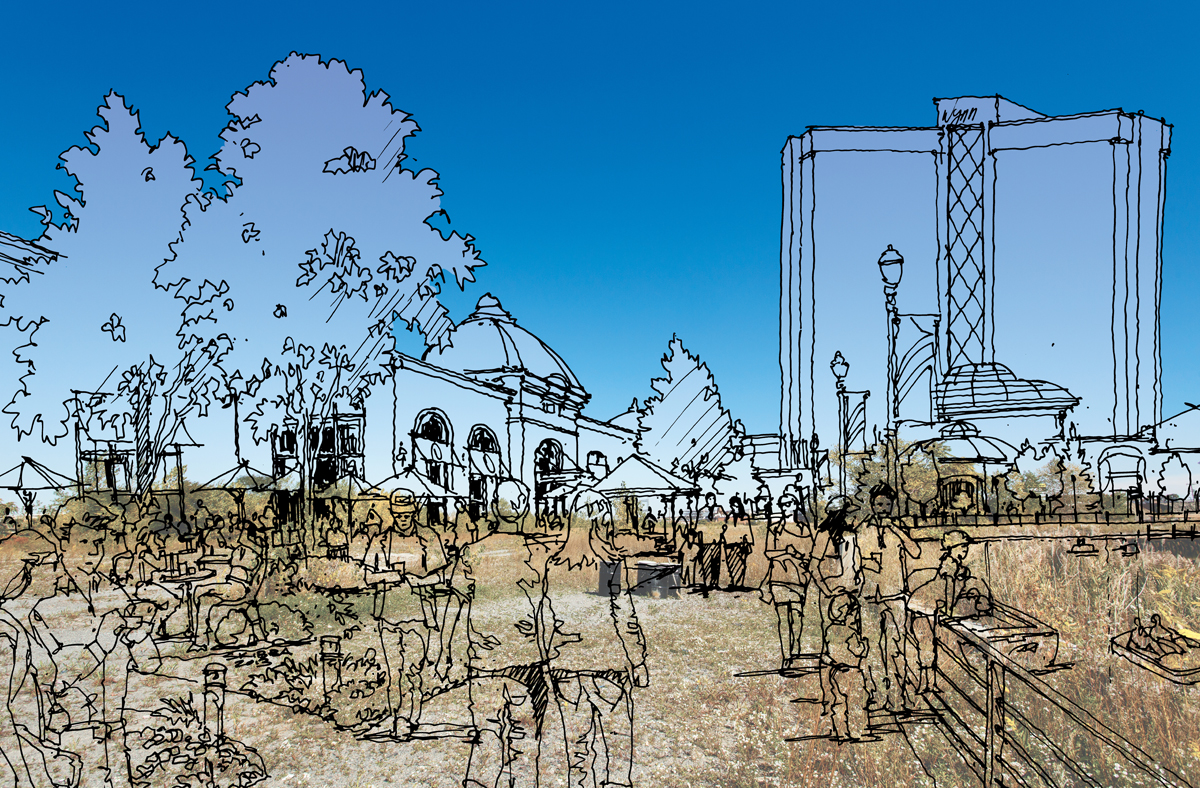Mr. Wynn Comes to Everett
Editor’s note/spoiler alert: As the November issue of Boston magazine was going to press last Friday, Suffolk Downs announced a major change to its casino plans. We stopped the presses and were able to add a brief update to this story, which will appear on newsstands later this month. In the meantime, we’re publishing the story here online, in a form that differs slightly from the magazine version and which incorporates additional reporting conducted after the magazine went to press.

Photographs by Bob O’Connor / Illustrations by Joe Skibba
It was a muggy, overcast August day and Carlo DeMaria, the mayor of Everett, had called a press conference to pick a fight with Tom Menino. The affair was being held in the south of town, at the old Monsanto chemical site on the banks of the Mystic River. With shrubbery poking through the rock-and-gravel surface of the 37-acre plot, it looked like an overgrown moonscape, or, at the very least, the set of a bad dystopian action movie. The place has been all but abandoned for decades, too contaminated for use. But Las Vegas casino mogul Steve Wynn is proposing to clean it up in order to build a $1.2 billion gambling palace.
To escape the drizzle, the few dozen people in attendance crammed together under a small tent to hear DeMaria speak. “For too long, Everett has been treated like a second-class city to Boston and Somerville,” steamed the mayor, a big and wide fellow with a scrunched-up face and slicked-back hair. “We just want some respect.”
At issue was Menino’s recent claim that Wynn’s proposed casino site creeps over the Everett-Boston border. By the letter of the Massachusetts gaming law, that would have given the Boston mayor veto power over Wynn’s application for a casino license. The state will award only one license in the Boston area, and Menino, a loud supporter of a bid from the Suffolk Downs horse track in East Boston, would love to clear the field of any competition.
DeMaria thundered from the lectern that Menino would not be allowed to “bully the city of Everett.” For DeMaria, who, at age 40, has been mayor since 2008, this project is everything. His city and its 42,500 residents have long shouldered many of Boston’s burdens, serving as the region’s de facto engine room: Everett’s 3.36 square miles are crammed with industrial sites and scrap-metal yards, to say nothing of the 21 ExxonMobil oil tanks or the giant MBTA maintenance facility, without which the T could not function. And every week, tankers as long as three football fields carry millions of gallons of liquefied natural gas—a substance so volatile that an attack could spark a fireball a mile wide—down the Mystic River to dock in the city. The gas fuels an adjacent power plant that churns out 30 percent of Greater Boston’s electricity.
The plot where DeMaria stood is yet another example of Everett’s history of doing the region’s dirty work. In 1868 New England Chemical opened a plant there—sold to the Monsanto Company in 1929, after bouncing around between a few owners—that pumped out chemicals for the better part of a century. Those chemicals, shockingly, were not always disposed of properly. Today, the site is rife with arsenic, lead, petroleum waste, and the residues of sulfuric acid. Swimming in the water is not recommended.
Prosperity may not always be easily within reach in Everett, a city with a median household income of just under $50,000, compared with more than $60,000 statewide, but it is teasingly within sight. From where DeMaria stood, he could look in one direction and see the booming yuppie haven of Charlestown, and, in the other, resurgent Somerville and its new multimillion-dollar Assembly Row development.
It’s not as if Everett is unaware of the potential pitfalls of a casino: City officials have heard the arguments about traffic, crime, and gambling addiction. But standing at the podium, DeMaria could see opportunity around him where there used to be only an ugly, useless brownfield. And so the mayor had thrown himself behind the Wynn proposal, insisting that a rehabilitated Monsanto site, with a spectacular casino on it, would spark a renaissance in Everett and at last deliver success and stature to the blue-collar city. Behind him as he spoke was a giant red banner declaring, “It’s Our Time.”
As the press conference was about to conclude, a reporter, citing the struggles of other places that pinned their turnaround hopes on gambling, piped up with one last question: What will make this casino proposal different from all the others that have promised civic redemption, but failed?
“The difference,” DeMaria replied, “is Steve Wynn.”
“You’re telling me there’s no better part of Everett than where I was?” Steve Wynn asks. He’s talking about the proposed casino site. No, I explain, it’s not all quite like that. Sitting in his “villa” at the Wynn Las Vegas—essentially an apartment built into the hotel’s first floor—he tells me he has visited town three times and not seen much besides the site. “You can see now,” he says, speaking of Everett, “I know not very much.”
Dressed in black leather boots, navy pants, and a short-sleeve shirt with a couple of buttons open, exposing a tuft of chest hair, the billionaire Wynn gets up to show me around. On the far wall hangs a Picasso called La Femme au Chat. Across from it is another, the artist’s self-portrait Le Marin, which Wynn got as part of a swap for Le Rêve, the Picasso masterpiece he restored after accidentally sticking his elbow through it seven years ago. And nearby is Lichtenstein’s Deep in Thought, a colorful pop-art painting of a woman holding her head in her hands. That, Wynn says, “is a position I’m frequently in, ’cause I sit like this with a felt-tip pen, ’cause I’m a designer.”


